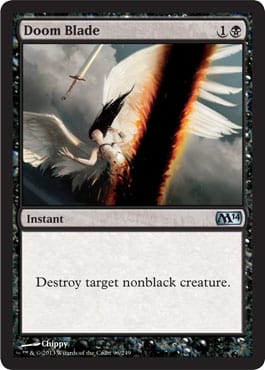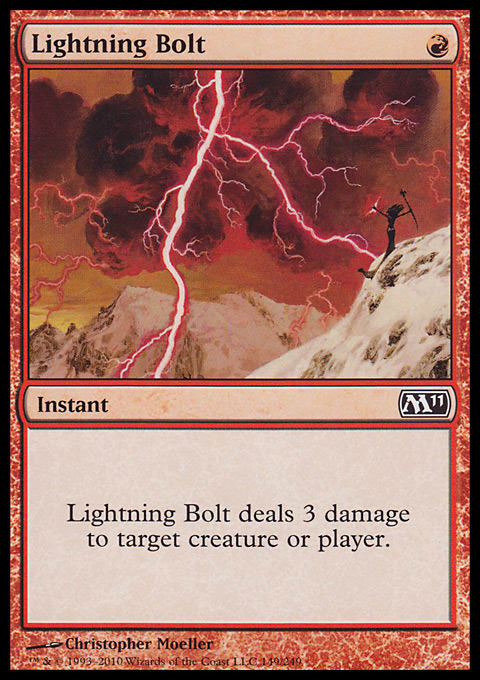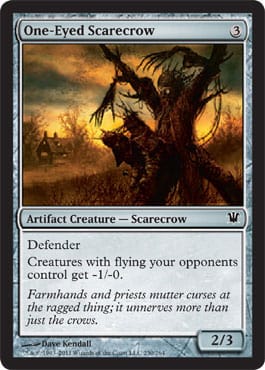High Roll?
I kind of wanna buy myself a shirt that says, “I'll play first.”
This pre-game exchange is such a waste of time for me because I have not chosen to draw once in my Magic career. Impressive, I know!
It's because the basic logic behind always choosing to play made sense to me:
- If you want to play first, choose to play first. If your opponent wants to play, you don't want him to go first and run you over, so go ahead and choose to play first.
- With identical hands, you are better off going first.
- When racing with same-sized creatures, the person who went first is ahead.
- How much better is turn-one Reckless Waif going first? That's right—about infinitely better! How much happier are you passing with turn-two Neonate into an opponent’s second land drop versus his third? That's right—about infinitely happier!
- I’ve been learning a lot from Hall of Famer Darwin Kastle, who has not chosen to draw first in years. Darwin is a big fan of W/U Spirits in Innistrad Draft. He explains why going first with flyers is so important: “You desperately want to go first when you have a lot of flyers. Your guys are usually smaller than the opponent’s, so being the aggressor and getting ahead in the life race is crucial. In addition, your deck is essentially not worried about late-game stalls thanks to the beauty of evasion.”
All this lead me to follow my high rolls with the words, “I'll play,” without ever giving it a second thought.
When I ask people about their choices to draw against me, after the match, they consistently reply, “It's that with this deck, the extra card matters.” I don't even know what the heck that means. It's an empty statement that doesn't actually explain anything. What's this magical extra card supposed to do?
Yet, I see people who repeatedly do well in high-level events choose to draw, in both Limited and Constructed. So, I decided that it's very likely that my thou-shalt-always-play-first! rule has some exceptions to it.
And if I want to advance as a player, I figured I better do a little research on the matter. So, if you’re like me (awesome), perhaps this will be a helpful piece of advice!
Daring to Draw
The first two advantages of drawing happen before any card even hits the board.
- When you have a shaky hand, both mulliganing and keeping is less risky. Remember how much faster your heart is beating when going to six on the play? And having one more turn to rip that second land for the life-saving Deranged Assistant can be a matter of life and death!
- You know whether your opponent is mulliganing before you have to decide. Disclaimer: To be honest, I don't recall my mulls ever being influenced by my opponents’, so I asked my Magic friends on Facebook if it’s ever come up for them. See a screenshot of the surprisingly insightful Facebook thread here. Alex Bertoncini put it well: “As basic as it sounds, cards in hand are resources, and judging the amount of resources you opponent has and doesn’t have, should influence exactly what you can/can’t keep.”
Now, consider the three scenarios when it can be beneficial to draw once the game gets rolling.
Awful Matchup
To be fair to my readers, I'll start with someone’s argument for why, in this case, you should play first. This is a quote from Limited expert Martin Juza in Steve Sadin's article Lessons from Kansas.
Interestingly, in general, Juza is a believer in drawing in Sealed. More on that later.
However, there is another, slightly more desperate school of thought regarding terrible matchups. Take a look at the following case:
In the winter of 2010, during Scars Draft, I witnessed a battle between two powerful Boston mages, Darwin Kastle and Jonathan Pearlman. Darwin ran over Jon Game 1 with a super-fast W/U metalcraft deck, only to hear Jon allowing him to play first again. Darwin proceeded to push Jon off the table as his army, powered by the might of machines, evolved and strengthened in front of my eyes, exactly as it did Game 1. Jon, in my opinion, is an extremely smart, strong technical player, so Darwin and I both were surprised that he chose to draw and allowed Game 1 to repeat itself. His explanation was pretty interesting: "My Draft went very poorly, and Darwin's Draft obviously went very well. I decided that my deck is so much worse than his that the only way I can win is if Darwin fails to curve out by running into spell/land-ratio problems."
The difference between this and Juza's approach is they're looking for different outs. Martin is hoping for a low-chance perfect draw on his part, and Jon is looking for a low-chance hiccup on Darwin's part. Think about it, and decide which one does a better job of maximizing your chances.
Walls and Bombs, Walls and Bombs
. . . when the game will go on long enough, and you will both probably be emptying your hands.
Think of choosing to draw in this way for a second: It's as though you cast a turn-zero Divination. Now, that seems pretty damn sweet doesn't it? Feels like really solid card advantage.
Why isn't everyone choosing it all the time, then? Turn-zero Divination seems sick! It is the basic definition of card advantage, of course, and card advantage it the key to victory, right?
Well, not quite. The problem with this is the same as with casting Divination any other time. That is to say that the most basic card advantage (I'm holding one more card than you) is actually the least relevant. The card in your hand isn't hurting anybody and isn't helping anybody. That's why when we get Mind Rotted, we just cringe a bit, but when we walk into a two-for-one off the pump spell during combat, we die a little inside.
So, if you start a game with four extra Moldgraf Monstrositys in hand and die on turn five to an opponent’s army of Neonates, you were at a card disadvantage because your savage beasts were never an option. (Oh, hey, let me link you to a really cool article on understanding card advantage!)
However, if you do make it to seven lands . . . Now, this is some juicy card advantage indeed! Here, we come to the reason control decks will often choose to draw: They are designed specifically around going to the late-game, when the hands will be emptied. And now, that magical “extra card"—aha!—will turn into having played one more spell to one-up the enemy. And if we're looking at Magic as questions and answers, the control deck asked one more question. And one more question is all it takes.
Of course, this is all much idealized. You won't draw the same number of lands, and you have flashback cards, and mythics these days should count for two—if not three—questions. However, this is the basic principle behind "the extra card." I feel that too many people say it without actually thinking about what it means.
Burn! Burn Everywhere!
This one is from my friend Blake, who back in the DCI world, made it into the Top 30 Massachusetts players based on rating thanks to exclusively Friday Drafts and midnight prereleases.
"Blake, give one good example of a general Draft archetype that should draw first."
"Hmmm . . . how about the all-removal deck?"
"Why?"
"Well. Let's simplify and take away flashbacks, Gravediggers, and so on. Then, having a card on the opponent is really important. The games will go dude-kill-dude-kill, and most of your removal should be cheaper than the thing it's removing. Once you've exchanged a bunch of cards, that one last spell in your hand will make all the difference."
And really, as we know, most answers are cheaper than the creatures they will probably be killing, so being behind a land drop shouldn't be handicapping you. But what would handicap you is the opponent having one extra guy you can't blow up.
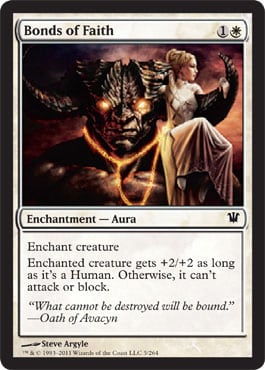 |
That just brought us back to one more question.
To tie together points two and three, it's basically, “How likely is it that all the spells will be played over the course of the game?” And now we come to Juza's general take on Sealed. “In my opinion, it doesn't even matter what your Sealed deck looks like," said Juza. “You should just draw every time. Most of the games go long and are ultimately decided by bombs, so you want to make sure that you draw your bombs as well as ways to deal with your opponents’ best cards. The extra card is definitely worth more than that couple of extra damage you might deal by going first.”
If you haven't thought about this before, let it sink in. It's one of the ways to look at things that step up your overall understanding of the game.
(By the way, here's an article that really did it to me with Sealed in general.)
Lessons Learned
If you think the game is going to drag on long enough that you’ll be emptying your hands . . .
. . . or . . .
. . . If most of the game you will be one-for-oneing each other until one of you plays something really difficult to deal with . . .
. . . having one more card can make all the difference.
Knowing the right times to draw first can also give you advantages in Limited by helping you realize when you are creating a deck that needs to be on the draw. One of the neat things about it is that you can usually count on your opponent choosing to play. Thus, you will probably be able to draw every game if that's what you want!
Here's a summary of the key points to keep in mind and be on the lookout for when putting together a deck that likes to draw:
- Remember what's bad about not going first and what your opponent is excited about with his tempo start. You know, these transforming 1/1s that threaten to grow into 3/2s that are lurking around. The Reckless Waif or Bloodcrazed Neonate example from early on. Luckily, there are some delightful early plays in this format for a control deck—especially in blue. Cantrips such as Think Twice and Thought Scour are yummy against the Waif. Typhoid Rats is a very solid 1-drop when on this plan. Everything with a chubby butt is your friend.
- Be wary of those sneaky little flyers that often don't care as much that you have one more juicy fatty than their side does. One-Eyed Scarecrow can be wonderful for this purpose (and it somewhat addresses Point 1 as well). In general, I feel that this card is way underrated. It's so great against the Lingering Souls dot dek, and a couple can shut down W/U altogether. It also saves you from the annoying intimidate Zombies.
- Finishers. If you are a Timmy as I am, you will enjoy drafting the draw deck because not only is it okay to draft powerful 5- and 6-drops, it is crucial to your success. You don't want “that extra card” to be an Unruly Mob—you want it to be Skaab Goliath, Markov Warlord, or Gravetiller Wurm. Nom.
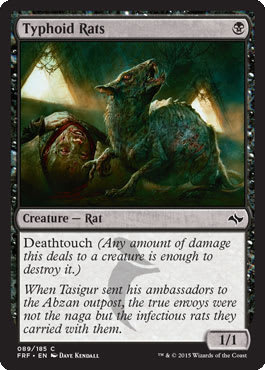 |
So, what kind of mage are you going to be at your next FNM? Will you lead an army of bloodsuckers and finish off your enemy by setting him on fire? Will you be on the other side, building barriers as you gather your strength to annihilate your foes with the most powerful beasts ever imagined? In the last, critical moment, will you reveal that you have the ultimate trick up your sleeve—the extra card?
You decide!
Thank you for reading!!!
Cheers,
Rada


















